Book contents
- Frontmatter
- Dedication
- Contents
- Acknowledgments
- Chapter 1 Introduction: Overview of the absurd
- Chapter 2 Setting the stage
- Chapter 3 The emergence of a “movement”: The historical and intellectual contexts
- Chapter 4 Samuel Beckett
- Chapter 5 Beckett's notable contemporaries
- Chapter 6 The European and American wave of absurdism
- Chapter 7 Post-absurdism?
- Chapter 8 Absurd criticism
- Notes
- Further reading
- Index
- Cambridge Introductions to …
Chapter 3 - The emergence of a “movement”: The historical and intellectual contexts
Published online by Cambridge University Press: 05 November 2015
- Frontmatter
- Dedication
- Contents
- Acknowledgments
- Chapter 1 Introduction: Overview of the absurd
- Chapter 2 Setting the stage
- Chapter 3 The emergence of a “movement”: The historical and intellectual contexts
- Chapter 4 Samuel Beckett
- Chapter 5 Beckett's notable contemporaries
- Chapter 6 The European and American wave of absurdism
- Chapter 7 Post-absurdism?
- Chapter 8 Absurd criticism
- Notes
- Further reading
- Index
- Cambridge Introductions to …
Summary
As discussed in Chapter 1, absurd literature developed in a post-WWII world. While it is commonly thought to be a response to the Holocaust and WWII, the comedic elements in absurd literature's tragicomedy and the enduring element of hope really embodies a post-WWII reality: aided by The Marshall Plan, with the massive efforts of rebuilding Europe underway by the time the plays of the absurd began to be written and emerge in public, there was a renewed sense of optimism in Europe and the beginnings of an economy that propelled a decade-plus era of economic prosperity on both sides of the Atlantic. Much of absurd literature was, in fact, written during this economic boom.
Unable to forget the horrors of the Holocaust and WWII, but also hopeful of the future, the tragicomic view took hold. Within the possibilities of a better future Europe and better future United States, there must have been – as first described in Kierkegaard's absurd – the “dizziness of freedom” and then, as suggested during and after WWII in Camus’ absurd – the need for a return to rationality in a world that itself is not absurd, but where humans endure an absurd situation where the world does not give humans what they want. The need for a true realism that Camus’ absurdity offered in a post-WWII world (as opposed to the belief in illusion or not accepting the reality of our absurd situation) mixed naturally with the comedic element of tragicomedy to also create ridiculous plots and characters.
It must also be stated – with emphasis – that the theatrical absurd was not happening all at the same time and in the same place. Yes, between 1948–1953, in Paris, the works of Genet, Ionesco, and Beckett were produced. But even 1953 Paris was quite a different place from 1948 Paris: the concerns of Europeans in 1948 were food and shelter whereas, by 1953, the reconstruction of Europe was well underway with the aid of the Marshall Plan. And by the time we see plays emerging from across the Atlantic in the United States, starting in 1958 with Albee's The Zoo Story, the United States, which was free (except at Pearl Harbor) from attack, was experiencing a major economic boom.
- Type
- Chapter
- Information
- Publisher: Cambridge University PressPrint publication year: 2015



